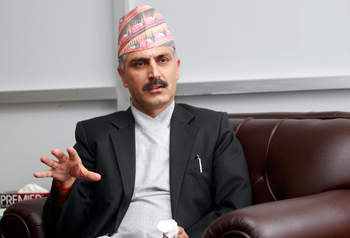Interview with Finance Minister Shankar Koirala.

BIKRAM RAI
Shankar Koirala: Last year’s budget came in three instalments and was bad for the economy, so this year we want to announce it on time. We have received various proposals from each ministry and for three hours every day we hold ministry-level discussions so that the budget comes out by 15 July.
How is this year’s budget going to be different than the previous editions?
Since we don’t have an elected parliament, this year’s budget will be passed through an ordinance. It will be election-centric. Besides that, we will also accelerate development and prioritise energy, infrastructure, agriculture, tourism, and export sectors. Instead of catering to populist demands, this year’s budget will address national development.
Can you make the budget project centred?
This is our chance to provide some sort of consistency to budget announcements. We have had various people asking us to prioritise certain sectors, but there is very little political pressure. So we will focus on proposals passed at local, regional, and central levels as well as those authorised by the National Planning Commission.
In the past, parties have siphoned off parts of the budget for their own cadre. How can you stop this culture?
We have stopped all forms of financial support including donations and won’t create ‘distributaries’ budget like in the past. This year’s programs have not been shaped by political greed or pressure.
Is it true that this government doesn’t have the power to change tax rates or announce a full budget?
No, the amendment to the constitution gave us powers to come up with a full-fledged budget. But we don’t plan to change tax rates.
Every year, development money ends up unused. How will you solve this problem?
This year’s budget will come on time. So we will ask the ministries to develop fully formed plans by 16 July and then give them the full power to implement those plans.
To read the original version of this article click here